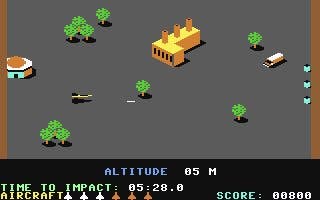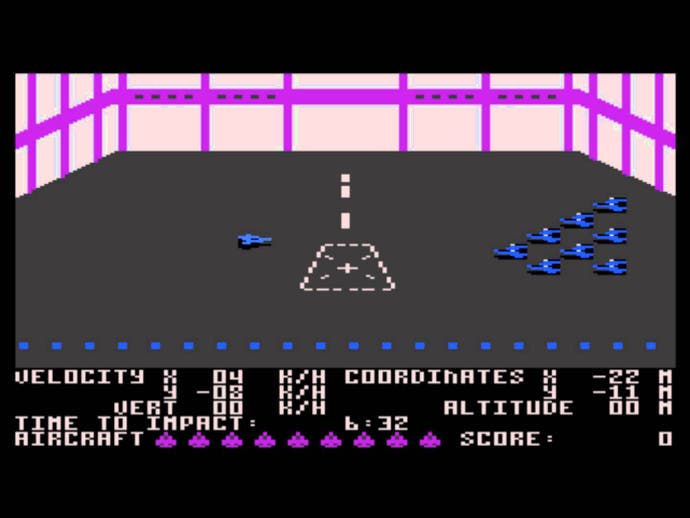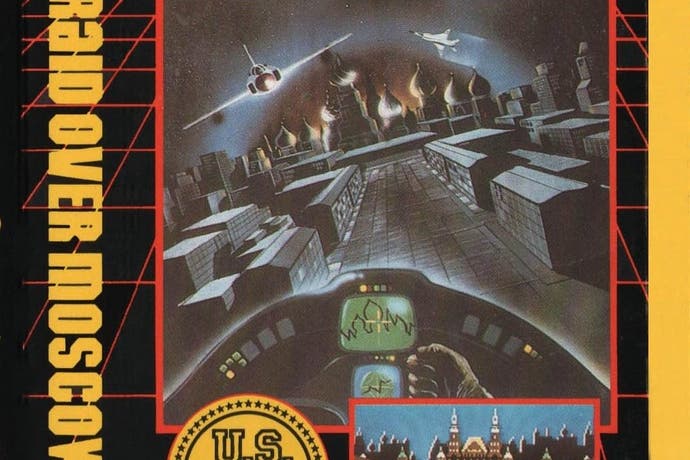Raid Over Moscow left me stuck in a garage in space
And I kind of liked it.
Back in 1984, a game like Raid Over Moscow had everything a primary school cold warrior could want. It had a doomsday scenario enlivened by a ticking clock. It had villainous Soviets, who were planning to launch three nuclear strikes from silos in Leningrad, Minsk, and Saratov. Best of all, it had a plucky last-ditch plan to save the day, crafted by those eternal underdogs the United States of America, and involving a team of heroic pilots waiting by their space planes in an orbital hangar.
It all seemed so simple! We'd get into those space planes, zip down to Earth, blast through the launch cities, destroy the silos, and finally roll up at the Kremlin to blow the seat of Soviet power into a billion radioactive fragments. Ticker-tape parades! Global peace! A devastating display of Reagan-era clear-thinking and unashamed leadership! This was propaganda so brain-bendingly rich in its explosive appeal that the Finnish government genuinely pondered banning it.
There was only one problem with the glorious US plan. I could never get my space plane out of the hangar.

Seriously, as far as I was concerned, that thing was stuck in there. It was like a corner sofa wedged in the bend of a difficult stairwell. The zipping, the blasting, the destroying and the radioactive fragments would all have to wait. I was left in the game's first screen - the preamble - straining to get out through the doors and down to the action. I don't think I ever managed it, either. Early setbacks like this probably explain why I never did join the military.
So what went wrong? I like to tell myself that Raid Over Moscow gave me a little too much control a little too soon. Granted, when you read the plot of Access Software's game, it doesn't exactly reek of complexity, but beneath the us-vs-them justification for politically-charged slaughter was an action adventure that did its thinking in a few more dimensions than I was previously used to. Back in those days, I was a dab hand with space planes that flew left to right and up and down. Raid Over Moscow did all this from an unusual perspective, however. You had to mentally project yourself into the screen in order to orient yourself, and by the time you did this, you were already careening into a wall. I was, anyway.
This doesn't mean I didn't enjoy the game, though. I didn't even mind my brothers brutally monitoring the time I got to play it. They added an extra frisson to my failure. They ensured that Raid Over Moscow fairly crackled with consequence whenever I got my hands on the controls.
The pacing, even for a short playthrough like mine, was perfect. First, the stern patriotism of the start screen, quickly followed by my pilot's measured, portentous walk to his craft. He would be beamed aboard in a second or two - I always found that part kind of fascinating - and then I was suddenly in charge. And after that? After that I was just as suddenly dead and everyone else was laughing. The gap between avatar and player had never yawned wider.
And, actually, I was kind of laughing too. The more I crashed out, the more I failed so spectacularly at the first hurdle, the richer the rest of the game grew around me. Leningrad! Minsk! Saratov! This is not the kind of itinerary that delivers much of a thrill to me these days, but back in 1984 it seemed wonderfully exotic and loaded with deadly promise. I could picture my potential adventures as that snub-nosed death rocket swept in low, confidently racing over enemy territory. I'd take out bunkers, tanks, any missiles those guys flung my way, and then, as troops scattered, the silo would loom overhead, monolithic and frightening. HQ would whisper a few crackly instructions in my ear - maybe they were just cheering me on, actually, or gasping in awe at what I had already achieved. No matter, I would bat them away and narrow my eyes. My jaw would set, and my unshaking hands would reach for that trigger one last time.
Since then, of course, I've seen the whole thing - on YouTube long plays, on a friend's old C64. I probably saw it back in 1984, to be honest, because I think I was the only person around who really struggled with leaving the hangar, and everyone else could finish the campaign with ease.
And the whole thing doesn't look bad, really: buildings vanish with a radioactive flourish under your onslaught, tanks flee from your righteous fire, and if the assaults on the silos - and the final sequence at the Kremlin itself - can't really deliver bullet hell, they at least manages to summon a kind of lazy bullet heck. On top of the action, there's a neat gambling element that revolves around how many planes you decide to take out of the hangar when measured against the time you have left before the missile hits, so it's even a little bit strategic in places. Granted, the final boss fight looks like you're facing off against a giant Soviet bird house, but desperate times call for desperate measures, right? Taken as a product of its era, it probably would have satisfied the six-year-old cold warrior that I was back in 1984. In truth, though, I didn't need much of the game in order to be satisfied. The hangar, the very first screen, was enough.

I've previously written about the mysterious appeal of the games I never got to play, but Raid Over Moscow feels like a slightly difference experience. After all, I got to play it - I just couldn't get very far. Looking back, it makes me think about something I'm sure everyone ponders now and then: where is your mind when you're playing a game?
I think it's often in two places at once. It's right there in the present, fighting the demonic hordes, gathering the Pikmin, taking cover from Sectoids and then popping out to return fire. It's also cast itself a little way ahead, though - a little way into the near future. It's plotting a scramble up the skill tree, it's planning what to do when the Pikmin have brought down the next wall, and it's imagining the horrors you'll face once the Sectoids are gone and the Thin Men leap into your sights. It's working on what happens once you're out of the hangar. A lot of games know that they can't satisfy you entirely with the here and now, so they have to tease you with what's lurking up ahead too. A lot of games work wonders with this tension, in fact. It can be a cheap trick and it can merely undermine what you're doing at the moment, but it can also be the cornerstone of what makes a game great - and in certain circumstances it can even allow the weaker players to mint something joyful from their failure. Games are generally designed to build towards certain effects for the people who are actually good at them, right? Occasionally, though, the bad player produces something magical through their inability to comply - the same way a leaky car might occasionally leave a stain that looks like a Picasso.
And - inevitably - with Raid Over Moscow, I was suckered in by the hope that lurks at the heart of every childish cold warrior: the hope that the world is simple, and that victory could always be a consequence of that simplicity. That's what kept me bouncing around that hangar, I think. The whole game was lurking up ahead, and it felt so close, so easy to reach. That ticker-tape parade! I knew I could get there! One fine morning...!
Even now I know that. I close my eyes and I'm back in that hangar, strutting over the metal flooring to the spot where my space plane waits for me. So much is at stake on the planet below. I warp inside and then I'm off for the first, the tenth, the millionth assault on my deadliest enemy: the doors to my own hi-tech garage. I spin woozily on the spot, and those doors slide open. Adventure awaits.









